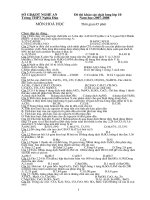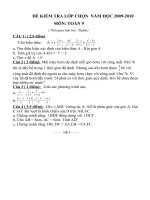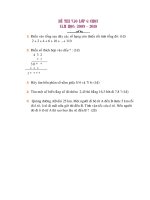- Trang chủ >>
- Đề thi >>
- Đề thi lớp 1
De thi vao lop chon 11
Bạn đang xem bản rút gọn của tài liệu. Xem và tải ngay bản đầy đủ của tài liệu tại đây (74.69 KB, 2 trang )
<span class='text_page_counter'>(1)</span><div class='page_container' data-page=1>
<b>SỞ GD - DT HÀ NỘI </b> <b>ENGLISH TEST 11</b> <b>Code : 123</b>
<b>TRƯỜNG THPT THANH OAI B</b>
<i><b>I. </b></i> <i><b>Choose the word whose underlined part is pronounced differently from that of the others in each group.</b></i>
1. A. blow B. show C. hole D. cow
2. A. high B. weigh C. tough D. sight
3. A. sugar B. butcher C. stumble D. cushion
4. A. lively B. kite C. driven D. bite
5. A. author B. other C. there D. breathe
<i><b>II.</b></i> <i><b>Choose the best answer to complete each of the sentences.</b></i>
6. The picture of the soldiers ___.
A. have sold B. has been sold C. has sold D. have been sold
7. Thunder often ____ small girls.
A. fears B. frightens C. frighting D. frightening
8. I couldn’t help ___ afraid when I was alone in the house.
A. be B. am C. being D. was
9. This is the material which I _____ for my new dress.
A. bought it B. have bought it C. bought D. bought them
10. She ____ fifteen years old tomorrow.
A. is B. is going to C. will be D. has
11. I’m sure the answer to my letter ____ by next Friday morning.
A. will come B. has come C. is coming D. was coming
12. It is rude to laugh ___ other people.
A. at B. to C. against D. for
13. We visited a college ___ in 1880.
A. find B. found C. founded D. finding
14. ____ Tom lately?
A. Have you seen B. Do you see C. Did you see D. Has you seen
15. In the window was a special display of ___ clothes.
A. baby’s B. baby C. babys’ D. babies’
16. ___ you angry with Helen?
A. Do B. Why C. Are D. Have
17. Read ___ on the board please.
A. a first sentence B. the first sentence
C. first sentence D. the sentence first
18. The police haven’t yet found the car _____ was in the accident.
A. which B. which it C. it which D. it
19. He died ____ hunger and cold.
A. by B. with C. of D. over
20. I ____ the cold weather in Paris.
A. use to B. used to C. uses to D. am used to
21. “Why was Bob so angry with his wife?”
“Because of ____ late”.
A. her to be B. her being C. she is D. she be
22. There are two temples and ___ of them are very old.
A. one B. all C. both D. each
23. All the furniture in the house ____ old fashioned.
A. is B. are C. have D. have been
24. I like these shoes, but they don’t _____ me very well.
A. meet B. fit C. agree D. reach
25. A person who is not brave is a ____.
A. coward B. carpenter C. soldier D. grocer
26. I wish we ____ go to Paris with him.
A. shall B. should C. can D. could
27. Please write your answer ____ink.
A. in B. by C. with D. of
28. She has gone to ____ .
A. restaurant B. home C. house D. church
29. That boy is better ___ English than I am.
A. in B. at C. for D. with
30. Now I ____ at night.
</div>
<span class='text_page_counter'>(2)</span><div class='page_container' data-page=2>
C. used to worked D. am used to working
31. There ___ some bread on the plate.
A. is B. are C. were D. has
32. He prefers this book ___ that one.
A. into B. to C. than D. from
<i><b>III.</b></i> <i><b>Choose the sentence which is closest in the meaning to the given one:</b></i>
33. They are building a new school in the village.
A. A new school has been built in the village.
B. The building of a new school in the village has just finished.
C. A new school is built in the village.
D. A new school is being built in the village.
34. He didn’t hurry so he missed the plane.
A. If he hurried he wouldn’t miss the plane.
B. If he had hurried he might catch the plane.
C. If he had hurried he could have caught the plane.
D. He didn’t miss the plane because he hurried.
35. It started to rain at 2 o’clock and it is still raining.
A. It has been raining at 2 o’clock.
B. It has been raining since 2 o’clock.
C. It has been raining for 2 o’clock.
D. It has been raining in 2 o’clock.
36. My uncle used to be a high school teacher.
A. He’s used to be a teacher of a high school.
B. He’s a teacher of the high school.
C. He once was a high school teacher.
D. He’s been a high school teacher.
37. Not many people attended the meeting.
A. No people came to the meeting.
B. A few people came to the meeting.
C. People didn’t come to the meeting.
D. Few people came to the meeting.
<i><b>IV.</b></i> <i><b>Choose the underlined word or phrase in each sentence that needs correcting:</b></i>
38. Studies shows that many students are unfamiliar with doing research.
A B C D
39. I remember to meet her before, but I have forgotten her name.
A B C D
40. Faraday’s father was so poor to send him to school.
A B C D
41. Do you know the girl sat next to Helen at the meeting last night?
A B C D
42. When I was young , I didn’t know the value of love until I lost it.
A B C D
<i><b>V. </b></i> <i><b>Read the passage and choose the word or phrase that best fits each space:</b></i>
Today the fastest way to get from one city the another in most countries is to fly. But the trains of the future will change the way
we travel. In West Germany and Japan, a new kind of train that floats (43) air is being tested. These trains are (44) Magnetically
Levitated Trains or simply Maglevs. They move on a magnetic cushion of air. On a recent (45) in Japan’s Kyushu island, a magnetic
train reached a speed (46) 320 miles per hour. The Japan National Railway hopes that (47) 1990, trains like this can replace the
Shinkansen, the bullet trains that travel between Tokyo and Osaka (48) 130 miles per hour. In Emoland, in north – western Germany, a
196 passenger Maglev trains (49) soon be tested at speed of 250 miles per hour. German engineers hope that in the future, a Maglev
train system will (50) the cities of western Europe.
43. A. on B. over C. at D. by
44. A. calling B. call C. called D. has called
45. A. article B. test C. exercise D. exam
46. A. in B. by C. with D. of
47. A. under B. by C. on D. over
48. A. at B. for C. with D. without
49. A. could B. can C. will D. would
</div>
<!--links-->









